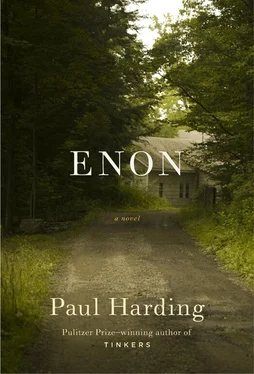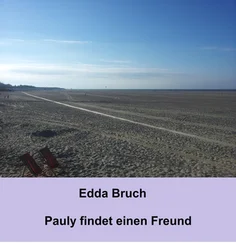Paul Harding - Enon
Здесь есть возможность читать онлайн «Paul Harding - Enon» весь текст электронной книги совершенно бесплатно (целиком полную версию без сокращений). В некоторых случаях можно слушать аудио, скачать через торрент в формате fb2 и присутствует краткое содержание. Жанр: Современная проза, на английском языке. Описание произведения, (предисловие) а так же отзывы посетителей доступны на портале библиотеки ЛибКат.
- Название:Enon
- Автор:
- Жанр:
- Год:неизвестен
- ISBN:нет данных
- Рейтинг книги:3 / 5. Голосов: 1
-
Избранное:Добавить в избранное
- Отзывы:
-
Ваша оценка:
- 60
- 1
- 2
- 3
- 4
- 5
Enon: краткое содержание, описание и аннотация
Предлагаем к чтению аннотацию, описание, краткое содержание или предисловие (зависит от того, что написал сам автор книги «Enon»). Если вы не нашли необходимую информацию о книге — напишите в комментариях, мы постараемся отыскать её.
Powerful, brilliantly written, and deeply moving Paul Harding has, in Enon, written a worthy successor to Tinkers, a debut which John Freeman on NPR called "a masterpiece." Drawn always to the rich landscape of his character's inner lives, here, through the first person narrative of Charlie Crosby (grandson to George Crosby of Tinkers), Harding creates a devastating portrait of a father trying desperately to come to terms with family loss.
Enon — читать онлайн бесплатно полную книгу (весь текст) целиком
Ниже представлен текст книги, разбитый по страницам. Система сохранения места последней прочитанной страницы, позволяет с удобством читать онлайн бесплатно книгу «Enon», без необходимости каждый раз заново искать на чём Вы остановились. Поставьте закладку, и сможете в любой момент перейти на страницу, на которой закончили чтение.
Интервал:
Закладка:
THE SPRING BEFORE KATE died, she decided that she wanted to make the girls’ cross-country team when she started ninth grade at the regional high school. She did track at the middle school but disliked just running around in circles, as she called it, on the course behind the school. She was at that age where a lot of kids appear to be and more or less are in shape no matter what they do, but, as limber and slim and athletic-looking as she was, I still could not believe how swiftly she could run the first time I watched her at a meet. She woke up early on a Saturday to start her serious training and I got up, too, intending to accompany her. I supposed I could manage the mile or two that I figured she was capable of, and I wanted to reconnoiter the route she’d told me she meant to use to make sure she wouldn’t have to cross any dangerous intersections or go for any stretches where she wouldn’t be within yelling distance of a house — even though I knew every stride of the route she’d described, having walked or ridden my bike on it, alone, since I’d been four or five years younger than she was.
As in shape as I thought I was from all the raking and mowing and bushwhacking, I was winded after half a mile. Kate’s legs were longer than I’d ever noticed. She took long, seemingly weightless strides, and appeared propelled not by her own exertions but by the graceful strength of her legs themselves. She hadn’t broken a sweat nor was there any trace of breathlessness when she asked me if I was already pooping out.
“Not pooping out, Kates; just warming up.”
Without breaking stride, Kate looked at the digital runner’s watch Susan and I had bought for her previous birthday. She pushed a button and the watch beeped twice. She undid the elastic band holding her hair in a ponytail, pulled her hair and twisted it up tighter against the back of her head, wound the elastic back around it at the base, looked at me and smiled, and said, “Okay, Dad.”
I knew that I was slowing her down, and that she wanted to run on her own, much faster and much farther than I was capable of.
“Just to Peters’s Pulpit,” I said. “Just to the Pulpit, and then I’ll let you do your thing, okay?”
“Okay, Dad. That’s okay,” she said.
Peters’s Pulpit was another half a mile. I intended to say something funny or nostalgic about the times we’d ridden our bikes there and had our impromptu picnics of chips and juice, but when we rounded the bend that gave way to the meadow with the rock in its middle, I felt Kate accelerate rather than pull up, so I veered off into the meadow and ran toward the rock, crying, “Help me, Hugh Peters! Help this sweaty old tub of guts!”
I kept running toward the rock and didn’t turn back toward Kate but waved my hand high in the air and shouted, “Go on! Go on! Save yourself while you can! I’m done for!” like in the old war movies we’d watched together late at night when she had had a tough time getting to sleep — all those corny John Wayne and Audie Murphy films.
Kate shouted, “Bye, Dad,” and lunged into a pace half again as fast as we’d been running together and disappeared around the bend. I half-sat against the rock, gulping breaths, and looked out across Enon Lake. The water near the shore was like sheer blue glass, transparent, filled with light, the lake floor lined with clean sand and smooth pebbles. Breezes etched themselves across the surface farther out, toward the center. I saw my reflection in the water and it angered and embarrassed me. I looked just the way I imagined I would: closer to middle-aged than I wanted to admit, a little heavy in the chops, sweaty, winded, my hair wet around the edges, the rest stood up by the breeze and salt in my sweat.
The name Enon, spelled Aenon for the first four years of the village’s existence, is from the Greek ainon , which is from the Hebrew enayim , which means double spring or, more generally, a place of abundant water. It is mentioned in the Gospel of John. The evangelist baptized in Enon because there was much water there . The best of Enon’s water is in the lake, which is spring-fed and famous for its clarity and taste. Whereas five years before, I would not have hesitated to scoop up a handful of water and slurp it down, to show Kate how pure it was, while telling her about its history, about the Indians who’d fished it and the colonists who’d exported it (although I would not have let her drink any, “Because your nice young guts might still get grumbly from the stuff in it,” I’d have said to her, or something like that), now I worried that something in the water might worsen the queasiness I felt from running and lead to some humiliating intestinal predicament as I headed back to the house. This made my mood worse, and I walked home cursing the lake and its clean water, and all the half-bullshit history I’d told Kate over the years, for no better reason than that she’d been a kid.
When I got back to the house, Susan was in the kitchen taking dishes out of the dishwasher and putting them away.
“That didn’t go so well,” I said. I felt embarrassed, not so much at being out of shape and foolish-looking in my old tennis sneakers and sweat shorts, but by how inexplicably angry I felt. I had always anticipated the day when Kate would suddenly seem not like a little kid anymore but like a young woman, or like someone I didn’t know. It wasn’t that I was surprised that she could run faster than me or that she wanted to run on her own without me. It was that it had happened so abruptly and taken me by surprise, even though I felt like I’d prepared myself for it a long time ago.
Forty-five minutes later, I had showered and was sitting outside with a cold beer when Kate came running up the road. She made a last leap across the seam between our driveway and the sidewalk, her finish line, and checked her time on her stopwatch.
“You suck .” She cursed herself with real anger, with an insular, personal seriousness that had become more frequent in the last months.
I knew that she would be provoked by anything that sounded like consolation, but I said, “Don’t worry. You’ll set a better time tomorrow. I screwed your concentration up, coming along, is all.”
“My concentration was fine, Dad. It had nothing to do with you.” She let the screen door slam behind her and stomped up the stairs.
I forced myself not to follow and try to make her feel better or explain why she shouldn’t take her training so seriously. There was a childishness in my impulse to dissuade her from placing such value on and devoting such effort to getting a better time on her run, or to excelling at her schoolwork, because I had not cared about such things in my own adolescence but had suffered the same degree of frustration with myself and the world, had found myself angry or sad for no reason. The beer had gone warm, so I tapped a couple of railroad ties in the retaining wall along the driveway, like I was checking them for rot, then poured the last couple of swigs behind the yew bush and went back inside.
5
MY GRANDPARENTS AND MY MOTHER DIED WHEN I WAS MORE or less fully grown. That’s the way I imagined things should be. I never knew my father; nor did my mother. (He and she spent a night together at a college homecoming weekend she’d gone to with friends. He didn’t tell her his name and they both left the next day and that was that.) I had no siblings. So behind me were the ghosts I always expected to have there, looking over my shoulder. But after the accident, ghosts surrounded me. My whole family made a circumference of ghosts, with me the sole living member in the middle. Or perhaps I was at the end; perhaps my family was not a circle but a procession in which we all had our supposedly proper places but then my daughter ran ahead of me into death. My great-great-grandfather was the farthest spirit back that I could imagine in any detail, because he was my grandfather’s grandfather and my grandfather had known him and remembered a few facts about him. He was a Methodist minister who’d had some kind of breakdown and been taken away and that’s about all my grandfather could recall. Beyond him trailed a parade of phantoms. He would have told me that Kate hurrying ahead into death was a blessing, a mark of grace and mercy that I, myself a grandson of dear old fallen Adam, was not competent to see as such. I found myself having imaginary conversations with him, in which he tried to console me with that point of view. I imagined myself wholeheartedly agreeing with him, not because I actually felt that way but because it seemed that he would be so convinced of what he said, so certain it was providence, and his certainty would be a comfort, however slight. I never once felt that there was any deeper goodness or benediction in Kate’s death, as easy as it was for me to imagine that idea, even accept its integrity. Because I understood that there are vastly greater meanings in creation to which I have no access did not mean that I could shed my sorrow.
Читать дальшеИнтервал:
Закладка:
Похожие книги на «Enon»
Представляем Вашему вниманию похожие книги на «Enon» списком для выбора. Мы отобрали схожую по названию и смыслу литературу в надежде предоставить читателям больше вариантов отыскать новые, интересные, ещё непрочитанные произведения.
Обсуждение, отзывы о книге «Enon» и просто собственные мнения читателей. Оставьте ваши комментарии, напишите, что Вы думаете о произведении, его смысле или главных героях. Укажите что конкретно понравилось, а что нет, и почему Вы так считаете.












